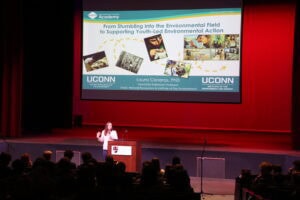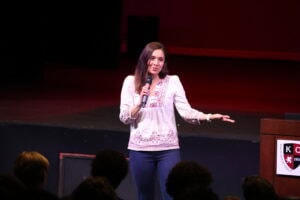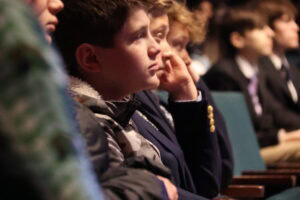April 15, 2025
Stumbling to Stewardship: Environmentalist Inspires at the Stroud Science Symposium
At this year’s Stroud Science Symposium, environmentalist and educator Dr. Laura Cisneros delivered a refreshingly honest and deeply personal keynote that left students and educators alike energized, inspired, and ready to take action. Cisneros, director of the Natural Resources Conservation Academy (NRCA) at the University of Connecticut, didn’t launch her talk with a list of credentials or a rigid career plan. Instead, she began with a truth that resonated across the room: “I want to start off by sharing how I stumbled into what I do today because I want to normalize that there’s no one direct path to pursue what you have in mind.”
That moment set the tone for a talk that was equal parts storytelling, science, and a heartfelt call to action.
Dr. Cisneros’ journey into environmental science wasn’t a straight line—it was more like a winding trail through unfamiliar terrain. Growing up in Ann Arbor, Michigan, as the granddaughter of immigrants from Oaxaca, Mexico, and Eastern Europe, Cisneros reflected on how her cultural heritage shaped her perspective. Though surrounded by nature and green spaces, she didn’t grow up thinking of herself as “outdoorsy,” although she was always interested in the sciences. She pointed out, “The messaging I got in the ’90s and early 2000s was that an outdoorsy person went camping. That just wasn’t my family.”
It wasn’t until a serendipitous conversation at a zoo—where a friend offhandedly suggested she consider an environmental career—that the seed of her future was planted. That simple suggestion nudged her to change her major to zoology and start exploring what environmental science really looked like in practice.
Dr. Cisneros’ hands-on experiences shaped her view of science. From internships in zoo and aquarium science to fieldwork in the rainforests of Peru and Ecuador, she shared vivid stories of radio-tracking monkeys, sleeping in tents for the first time, and even encountering anacondas and giant anteaters. Through these immersive experiences, she realized her passion wasn’t just in observing animals—it was in conducting research that could inform conservation strategies.
Her “aha” moment didn’t come in a lightning flash. Instead, it came gradually, through field studies, field mishaps, and deeply human experiences. “I really wanted to do something that had an application to it, and I could contribute to research that informed us about our conservation and management strategies.
Dr. Cisneros pursued her PhD at the University of Connecticut, focusing on bat ecology in Costa Rica. Her research explored how land use and seasonal changes impact biodiversity—an intricate dance of forest, farmland, and species responding to dry and wet seasons in unexpected ways. “We found that in the dry season, biodiversity was very high, and we had a moderate amount of forest and pasture,” she said. “In the wet season, we had higher amounts of biodiversity in large forest reserves.” She said that during the dry season, when there are fewer resources, you would assume they would all go into the forest reserves because you would think there were more resources.
She explained that bats, especially the leaf-nosed species she studied, are misunderstood and essential. “They help pollinate plants, disperse seeds, and control insects—some even eat frogs or fish!” she said. “They’re incredible indicators of ecosystem health.”Through her research, she began to see how science could serve communities—an idea that would later become central to her work.
Today, Dr. Cisneros directs the Natural Resources Conservation Academy (NRCA), a program that gives high school students and adult learners across Connecticut the chance to engage in real-world, community-based environmental action projects. From building rain gardens to analyzing tree cover, studying bats, or creating sustainability-focused art installations, NRCA participants tackle environmental challenges in personal and locally relevant ways.
“I want you to know that you don’t need to go far to make a difference. Environmental careers aren’t just about being in remote rainforests. They’re about community. They’re about people,” she emphasized.
Through NRCA’s Conservation Ambassador Program, students spend a week at UConn doing fieldwork—wading into rivers, trapping small mammals (humanely, of course), using drones and GIS software, and even learning bat acoustics under the stars. Then, over several months, they complete environmental action projects in their hometowns with guidance from community partners and undergraduate mentors.
Throughout her talk, Dr. Cisneros weaved in interactive “movement moments,” asking students to stand if statements applied to them. Whether they enjoyed parks, saw themselves as environmentalists, or believed they could make a difference, each invitation to stand became a visible reminder that everyone has a role to play.
Her message was clear: Environmentalism is not reserved for those who grew up hiking or camping—it’s for anyone who cares about their community and wants to make a difference. “I want to leave you with the idea that you can be the change makers today and in your community.”
In closing, Dr. Cisneros urged students to “stumble into their passions” through experiential learning, to step outside their comfort zones, and to see the environment not as a separate entity, but as the foundation of everything we do—from the air we breathe to the food we eat to the equity we strive for.
